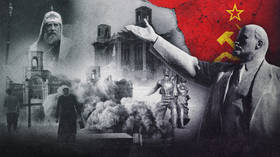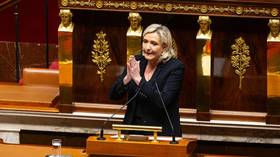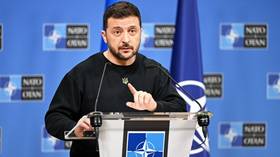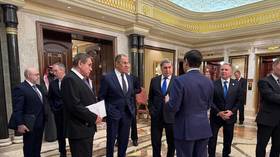Stalin ‘tribute’ installed in Georgian cathedral (VIDEO)
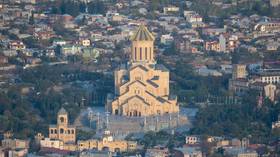
An unusual "tribute" to the late Soviet leader Joseph Stalin has been spotted in Holy Trinity Cathedral – the chief place of worship of the Georgian Orthodox Church in the nation’s capital of Tbilisi. A video showing the Georgian-born head of the USSR depicted in an icon inside the cathedral surfaced on social media earlier this week.
Stalin, wearing his signature trench coat, is depicted next to a female saint in the image. The context of his appearance in the icon is unclear. The news immediately drew the attention of some Georgian politicians, who rushed to link the development to alleged Russian influence.
“Russia is scoring solid success as both the EU and US fail to recognize the central role of weaponization of memory in Russia’s information warfare agenda, and that of Stalin in particular,” Giorgi Kandelaki, a former Georgian MP and a member of the Parliamentary Assembly of the Council of Europe (PACE), wrote on X (formerly Twitter) on Saturday.
An icon to none other but Joseph Stalin in the of the Holy Trinity Cathedral in Tbilisi. Russia is scoring solid success as both EU and US fail to recognize the central role of weaponization of memory in Russia's information warfare agenda and that of Stalin in particular pic.twitter.com/ejYE5CFngQ
— Giorgi Kandelaki (@kandelakigiorgi) January 6, 2024
Moscow and Tbilisi severed diplomatic ties in 2008 in the wake of the war in Georgia. The five-day conflict erupted on the night of August 8, 2008, when US-backed Georgian President Mikhail Saakashvili sent troops into the breakaway region of South Ossetia, shelling a Russian peacekeeper base. Moscow recognized the independence of South Ossetia and Abkhazia, another breakaway region, on August 26, shortly after defeating the Georgian Army.
Relations between the two neighbors have remained strained ever since. Direct flights between the two countries were suspended in 2019 and only resumed in May 2023.
On Saturday, Kandelaki also blamed Stalin for the “destruction of Georgia’s independence” during the Soviet era, as well as for the establishment of the “Soviet totalitarian system” and the persecution of the Orthodox Church.
The Georgian Orthodox Church confirmed the existence of an icon depicting Stalin, adding that it had no objections. People who persecuted the Orthodox Church are sometimes also depicted on icons, Andria Jagmaidze, the head of the press service of the Georgian Orthodox Patriarchate, told local CNews media outlet on Saturday. “There is a fresco depicting Diocletian” as well, he added - in reference to the Roman emperor responsible for one of the largest and bloodiest persecution campaigns against early Christians.
Under Stalin, the USSR carried out a massive campaign of persecution against “churchmen and sectarians” in the 1930s. More than 31,000 people linked to the church were arrested in 1937 alone. A total of 13,671 people were sentenced to death, including 81 bishops, 4,629 priests, and 7,004 ordinary parishioners.
In 1943, during WWII, the Soviet leader met with three Church metropolitans in the Kremlin. The Orthodox patriarchate was then officially restored in the USSR and a new patriarch was appointed. The authorities legalized bishops’ councils, re-opened many churches and monasteries, and released some priests from prison and exile.
After the war, the persecution resumed, although not as brutally and on a smaller scale.
Stalin’s legacy remains controversial in Russia as well. Although many people link his name to the USSR’s victory over Nazism in 1945 and to a major industrialization campaign that turned the Soviet Union into a nuclear armed power, others blame him for the most massive and brutal periods of repression in the nation’s history and call him the architect of a totalitarian regime.
